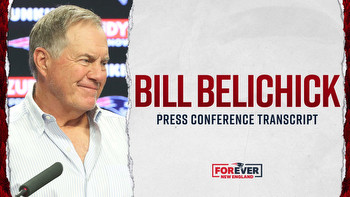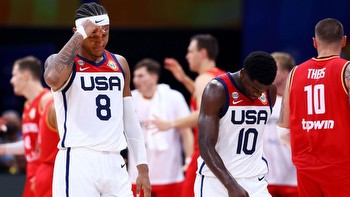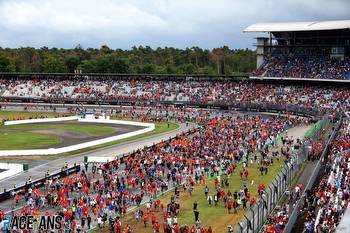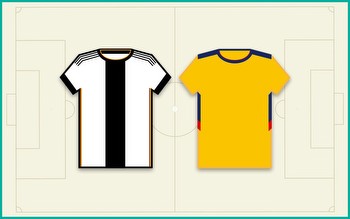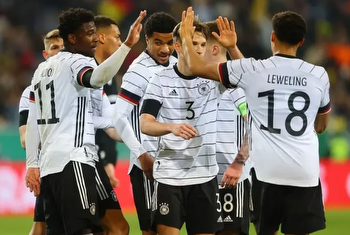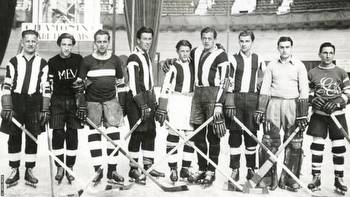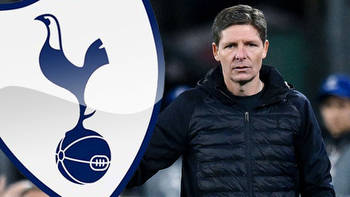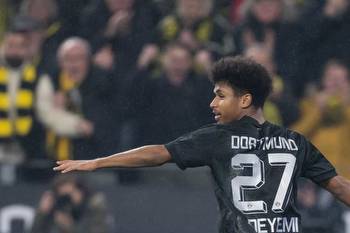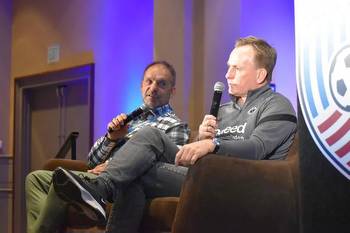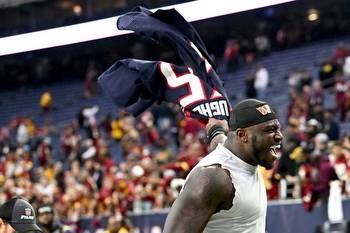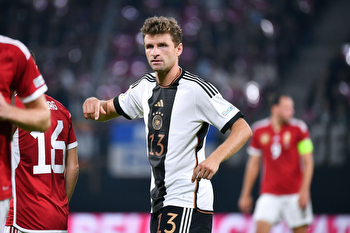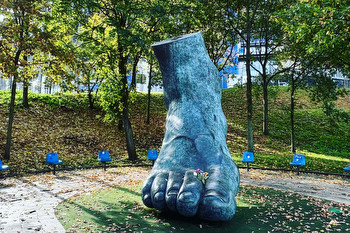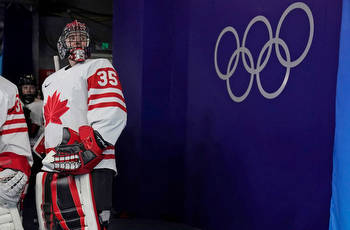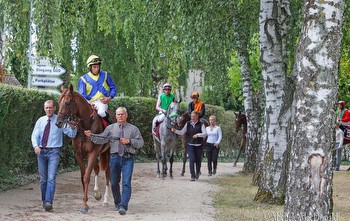American Fritz Polite fueled rise in popularity of U.S. football in Germany
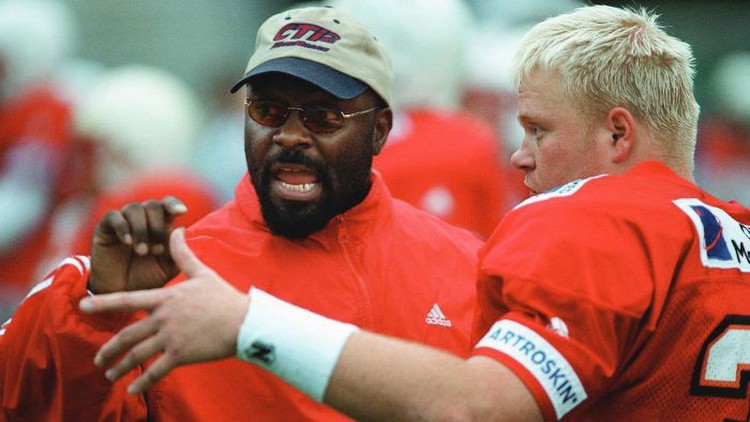
FRANKFURT, Germany — Fritz Polite arrived in Frankfurt in 1984.
A 1982 graduate of Simpson College in Iowa, Polite had joined the Army two years earlier on his 23rd birthday.
“The economy was down. I couldn’t get a job. My dad served 23 years. He talked to me and said, ‘Hey, son. That might not be a bad idea.’ So, I signed up on my birthday.”
After a year of basic training, Polite was deployed to Germany and was stationed at the 97th General Hospital serving as an infantry/combat medic. He had played Division III football but thought his playing days were over.
Then one day, one of Polite’s friends told him that he was going to practice.
“I said, ‘What kind of practice?’ ” Polite recalled during a recent phone conversation. “He said football practice. I didn’t even know they had football [in Germany]. I had no idea.”
Polite went with his friend and watched practice. That began his 13-year odyssey into American football in Germany.
“I watched the talent and I said, ‘I can do this,’ ” Polite said.
As the NFL enjoys its enthusiastic acceptance in Germany, Polite can take credit for being part of a vanguard of U.S.-born players and coaches, many of them African Americans, who created an appetite for American football in Germany. The appetite was evident in the NFL’s success in Munich last year when the Tampa Bay Buccaneers played the Seattle Seahawks and in Frankfurt on Nov. 5 when the Kansas City Chiefs played the Miami Dolphins. Another robust crowd is expected Sunday when the Indianapolis Colts play the New England Patriots.
“I like to think that I was a little bit part of the growth of American football,” Polite said. “The culture for American football was not there. We had to kind of educate them on, ‘this is what we do, this is how we do it.’ ”
After watching his friend practice that fateful day in 1984, Polite played the last four games of the season for the German Football League’s Offenbach Bieber. A year later, he joined the Frankfurt Gamblers. Five years later Polite was named GFL Player of the Year.
When the Gamblers fired the coach, Polite became the team’s player-coach. As a recruiter, Polite tapped into a pool of talented players, many of them African Americans, stationed at military bases.
“I went out and started recruiting brothers from the base, the military guys who played college — most of them at HBCUs. I brought them onto the team and that’s how we won,” he said. “We had the top quarterback, the top running back, that’s how won those championships.”
The Gamblers won titles in 1993 and 1994, and he introduced Gamblers fans to the all-important concept of tailgating.
“Germans don’t tailgate,” he said. “They go to the pub, they go to the bar, have a drink, then go to the stadium. When I came, I started tailgating. I started showing them what a tailgate was.”
After the Gamblers folded in 1994, Polite went to the Neu-Isenburg Jets of the Regionalliga. In his one season with the Jets, the team was undefeated, After that, that he spent a season with the Stuttgart Scorpions and the Basel MeanMachine.
By the time he left Germany in 1995, Polite had witnessed the enormous appetite for American football.
“Football was beginning to catch on. It was starting to be the cool thing to do,” he said. “It’s a very distinct group of people who follow American football.”
After his time in Basel, Polite went to Switzerland, where he established and coached the first Swiss national American football team.
Polite left Switzerland for the United States in 1997. He enrolled at Florida State where he pursued his doctorate. Today, Polite, 63, is the associate vice president for student leadership and development at Shenandoah (Virginia) University.
Oliver Luck, who played a major role in the NFL’s German initiatives, said that Polite and other African American soldiers played a major role in creating an appetite for American football in Germany. Luck was general manager of the Frankfurt Galaxy from 1991 to 1992 and the general manager of the Rhein Fire from 1995 to 1996.
“There was a significant African American contribution,” he said. “There were white soldiers who contributed as well. But I think there was a much higher percentage of African American soldiers who stayed in Germany, married German women and were instrumental in developing, way back in the ’70s and ’80s, these American football clubs that formed the basis of the amateur world.
“They knew the game, they cared about the game, they organized youth teams, they taught they coached, they played a very important role that really hasn’t been acknowledged or chronicled,” he said.
American football has deep roots in Germany, going back to the World War II when U.S. troops were stationed on military bases throughout the country. American football was played on those bases by soldiers, many of whom had played in college. The formal NFL presence in Europe began in 1974, when the league announced plans to launch the Intercontinental Football League, which never launched. The GFL was established in 1979. In 1989, the World League of American Football was formed and rebranded as NFL Europa in its final year of operation. The league was dissolved in 2007.
After successful forays into London, the NFL has found a gold mine of interest in Germany. Last year’s game in Munich was sold out and tickets for both NFL games in Frankfurt sold out in minutes.
In some ways, the growth of American football in Germany symbolizes a sort of identity crisis that has developed in Germany since World War II, as generations of youth have become Americanized.
“It’s less the game itself but everything around it,” Steve Voltz said. “It’s the cheerleaders, the food, all the activities around it.” Voltz is one of the players Polite coached during his only season with the Neu-Isenburg Jets. Voltz remembers being pressed into service as a quarterback.
“There was an injury, and somebody asked if someone could play quarterback, at least hand the ball off,” Voltz said. “I ended up becoming the quarterback for Fritz Polite. That’s how our relationship started and blossomed.”
Voltz is the women’s soccer coach at Louisiana Tech. In 1990, he was an aspiring football player with Neu-Isenburg. A native of Offenbach, Germany, Voltz is one example of how American football has become a significant presence in Germany.
Voltz and his family moved to Melbourne, Florida, in 1985 after his father died. It was there that Voltz was exposed to American football.
“I fell in love with the game but never thought of playing it. I was just a fan,” he said. “Then one day, a football coach came over to where the soccer team was practicing and asked our coach if there was anyone who could kick.”
Voltz volunteered. He kicked and punted in high school, then enrolled at the University of Florida and tried to make the football team as a walk-on.
“That was my typical foreigner introduction to American football: kicking,” Voltz said. “But I was way too clueless about the game.”
Voltz returned to Germany in 1990 and discovered a version of American football with the Neu-Isenburg Jets. That’s when he met Polite, who pressed Voltz into emergency service as a quarterback. Polite switched Voltz to tight end later and, more importantly, became a mentor for life.
“I learned a lot from him and take a lot of those lessons to this day with me in my coaching,” Voltz said.
The coverage of American football in Germany has grown exponentially. Voltz remembers one year he was unable to watch the Super Bowl because he was flying home to Germany. When he tried to find a recap of the game on German TV, there was only a 30-second clip.
He is not surprised by how quickly the Germans have embraced NFL football.
“Now you have channels dedicated to the game in Germany,” he said. “I think that is really smart marketing one their part. They saw that there is a market there, not only on TV but in person. There’s a culture there that wants to be exposed to that entertainment value. I’m sure if they ever decide to put a team there, it will be loved and followed and will have tremendous support.”
Voltz wrote his master’s thesis on the impact of American culture on German culture: Pop culture and language in German: The Americanization and national identity crisis.
“The English has really infiltrated the German culture and the language quite a bit,” he said. “Most of the young people speak English and they are so happy to accept American culture with food, going out. A lot of the music is American music.”
Voltz said he used the phrase identity crisis because “some of the German traditional values, while they haven’t disappeared, are not prominent in German youth anymore.” Basic terms such as “cheerleader” and “touchdown” have become part of the German lexicon.
“When I grew up, I never knew what that was,” Voltz said. “I didn’t know what American football was.”
Kevin Christoffers, 44, who was born in Frankfurt, is one of those young Germans who embraced American football culture. His American father was in the military, and his mother is German. Christoffers was raised on football, in large part because of the World League of American Football.
Christoffers didn’t get involved with team sports until he began playing football. He fell in love with the sport but wasn’t very good.
“I totally skipped soccer.” he said earlier this week. “I was so bad [at football] in the beginning that I had some German coach tell me, ‘This might be the wrong sport for you.’ My best friend’s dad told me, ‘You’ll never be good enough to start for a bad high school football team in the States.’ ”
Christoffers joined the Neu-Isenburg Jets youth team in 1993. He met Polite two years later when Polite took over as Jets coach. Although Polite technically coached the adult team, he also was a major presence in the youth team.
The American influence on the team was profound. Polite recruited a handful of American high school students to join the team and his coaching staff was made up of active-duty military personnel.
“Having the knowledge of these guys really helped propel our team and having all the Americans on the roster had a huge impact on team culture and the understanding of football,” Christoffers said.
“Even if there were more Germans, the team language was English. This exposure to the language had major impacts in the level of understanding of the language. Communication in English became sort of natural, even for the Germans.”
By the time he turned 17, Christoffers was rated as one of the top American football players in Europe for his age group. His family encouraged him to attend high school in the United States with hopes of securing a football scholarship.
Christoffers left Germany in 1996 after the 10th grade and attended Madison Consolidated High School in Madison, Indiana. He wound up walking on at the University of Louisville, then transferred to the University of South Florida, where he suffered a career-ending knee injury.
He returned to Germany and joined the Neu-Isenburg Jets, where Polite was his coach.
“To this day, he’s pretty much like a second father to me,” Christoffers said. “Fritz is humble. He’ll never acknowledge just how many lives he impacted during his coaching career.”
Christoffers also worked for the NFL, helping to organize the league’s games in London. He also began lobbying for the NFL to bring games to Germany. “Because of my experience in Germany and knowing about the passionate fan base, I was the one who made a passionate plea to Roger Goodell to bring the NFL to Germany,” he recalled. “This was back in 2014 and the people at the London office were not thrilled with me raising this issue to the commissioner.”
The NFL is certainly pleased that the perception of American football has evolved. Before it was just massive bodies in helmets and shoulder pads. “It was colorful and loud and pageantry,” Voltz said. “Now, they are actually educated about the game. People know what an interception is, they know what a field goal is. They know the nuances.”
Last week during a fan fest event in Frankfurt, Goodell threw cold water on the idea that the NFL will put a franchise in Germany anytime soon. Goodell said the league wants to stick with the current format of playing regular-season games outside of the United States.
Voltz believes that a German NFL presence could become a reality in the next 10 years.
“I think eventually we will have a full-time team in Germany,” Voltz said. “I really do believe that’s where it’s headed.”
Time will tell. But whatever next steps are taken, unknown soldiers like Polite helped pave the way.
“Fritz and I are the first generation of when football really started getting serious [in Germany],” Voltz said. “It’s fun to see how the game has evolved because we accepted the culture so quickly.”


